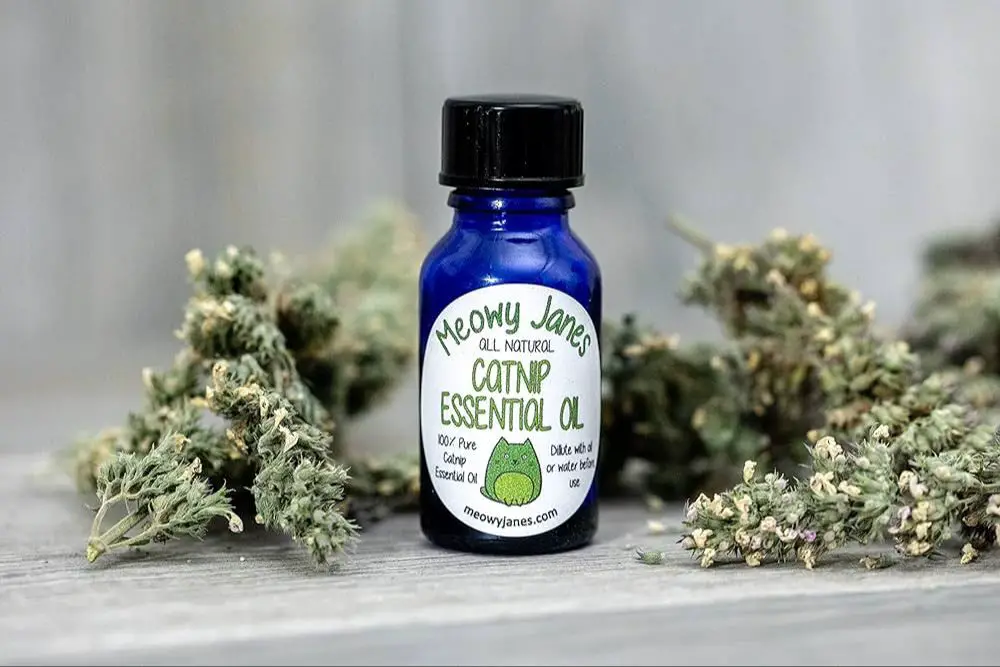What is Catnip and How Does it Affect Cats?
Catnip, also known as catmint, is a plant with the botanical name Nepeta cataria. It is a member of the mint family and contains a chemical compound called nepetalactone. This oil is present in the stems, leaves, and flowers of the catnip plant.
When cats smell or ingest catnip, the nepetalactone binds to receptors in their nose and mouth, stimulating a response. Catnip affects the typical feline’s nervous system and triggers a range of behaviors including sniffing, licking, chewing, head shaking, rolling, and rubbing. Though the response varies by cat, most display a sort of temporary euphoria or intoxication. Once this wears off, typically lasting between 5 and 15 minutes, the cat loses interest.
Catnip appears to have an attractant effect on cats – it stimulates them and draws their attention. Not all cats respond to catnip; studies estimate somewhere between 50 and 70 percent of cats exhibit a sensitivity to it. It does not appear to have any addictive properties.
Catnip is generally considered safe for cats to enjoy. But giving too much may cause vomiting or diarrhea. It is best to use small amounts of catnip to play with your cat and avoid overstimulation.1

Does Catnip Have Any Effects on Humans?
While catnip acts as a stimulant in cats, it does not appear to have any major effects on humans. The key compound that causes a reaction in cats is called nepetalactone. Humans can detect the smell of nepetalactone, but it does not seem to trigger any overt effects the way it does in cats (1).
Some people have reported feeling mild sedative effects after consuming catnip tea, but catnip is not known to act as a recreational psychoactive substance in humans the way it does for cats. There is no scientific evidence showing that catnip can get humans “high” in the way many assume (2).
Overall, while the smell of catnip may be pleasing to some humans, it does not induce any type of intoxicating effects. Catnip is not considered to have any potential for recreational use or abuse by people.
Potential Health Benefits of Catnip for Humans
Catnip has traditionally been used in herbal medicine as a tea, tincture, or poultice for treating anxiety, insomnia, and headaches. The main active compound in catnip, nepetalactone, is thought to act as a relaxant and mild sedative by interacting with the GABA neurotransmitter system in the brain (WebMD).
In addition to its sedative properties, catnip also contains antioxidant and anti-inflammatory components like rosmarinic acid and caffeic acid (Healthline). These are believed to provide several other health benefits:
- Relieving digestive issues like cramps, bloating, and indigestion
- Reducing anxiety and stress
- Providing pain relief from headaches and migraines
- Inducing sweating to lower fevers
Some initial research also indicates catnip may have anti-cancer effects by inhibiting tumor growth and inducing cancer cell death. Other studies suggest catnip may have neuroprotective properties and help prevent oxidative damage in the brain (Drugs.com).
However, more research is still needed to fully understand the medicinal capabilities of catnip in humans.
Using Catnip Tea and Tinctures
Catnip can be consumed as a tea by steeping dried catnip leaves in hot water for 3-5 minutes then straining. Most recommendations for catnip tea are to use 2-3 teaspoons of dried catnip per 8 ounces of boiling water and let steep for at least 5 minutes before drinking (source). Some add honey or other sweeteners to improve the flavor. Caution should be taken with the tea as high doses may cause headaches or upset stomach.

Catnip tinctures or extracts can also be taken, usually with a dose of 1-2mL taken 1-3 times per day. As with the tea, caution is advised when taking catnip tinctures as high doses may cause side effects. Some potential side effects of catnip tea or tinctures can include headaches, nausea, and diarrhea. Start with a low dose and increase slowly to assess your personal tolerance.
Catnip Essential Oil Uses
Catnip essential oil has some popular uses, especially when used topically or inhaled. The primary active compound in catnip oil is called nepetalactone, which is known to have a soothing, relaxing effect (Plant Therapy).
Inhaling catnip oil by diffusing a few drops can promote relaxation and may help induce sleep. The scent of catnip oil can have a calming effect when inhaled (AromaWeb). Properly diluting catnip oil and applying it topically may also provide relaxation benefits. Always mix catnip oil with a carrier oil like coconut or jojoba oil before applying to skin.
For topical use, dilute catnip oil at a ratio of 1 drop of catnip oil to 1 teaspoon of carrier oil. As an inhalant, diffuse 3-4 drops of catnip oil in an essential oil diffuser. Inhaling catnip oil is generally safe, but ingesting catnip oil can be hazardous. Only use catnip oil externally or for inhalation purposes (NatureInBottle).
When used properly, catnip oil may offer potential relaxing, anxiety-reducing, and sleep-promoting benefits. However, more research is still needed on using catnip oil for these purposes.
Catnip Capsules and Supplements
Catnip is available in supplement form as capsules, tablets, and extracts. Some people take catnip supplements for potential benefits such as stress relief, improved sleep, and reduced anxiety.
According to Amazon, Swanson Full Spectrum Catnip capsules contain 400 mg of catnip and are intended as a traditional aid for stress management (source). Typical recommended dosages of catnip supplements range from 200-500 mg taken 1-3 times per day.
One study gave participants 600 mg per day of a patented catnip extract called Nepeta cataria. After 2 weeks, the catnip group reported improved sleep quality compared to placebo. However, larger studies are still needed (source).
Organic Catnip capsules from NOW Foods contain 450 mg of catnip per capsule. The recommended dosage is 1-2 capsules taken 1-3 times daily between meals. Potential benefits highlighted include supporting cramps, fever, and stress (source).
While catnip capsules and supplements are generally considered safe, little research has been done on their effects and potential side effects in humans. It’s best to consult your healthcare provider before taking catnip supplements regularly.
Other Potential Uses for Catnip
Aside from the health and wellness applications of catnip described above, there are some other interesting ways humans can use catnip. Here are some of the other potential uses for catnip in humans:
Catnip can act as a natural insect and mosquito repellent. The active compound nepetalactone is known to be effective at repelling mosquitoes and other insects when applied topically or diffused in air. Some studies have found catnip oil to be as effective as DEET at warding off mosquitoes without the harsh chemical effects of DEET. Catnip natural bug sprays and candles can provide an environmentally-friendly alternative for keeping insects at bay.

Catnip can also be used as a natural additive to cat toys or scratchers to attract cats. The typical catnip toys and scratchers contain dried catnip to entice play and scratching from cats. Cat owners often keep some dried catnip handy to refresh old toys. The scent from crushing the catnip gets cats excited and engaged in play.
There are some culinary uses for catnip as well. The leaves, flowers, and stems can be used fresh or dried in salads, broths, and even desserts. Catnip has a mint-like flavor profile lending well as an ingredient in food and beverages. The essential oil of catnip also contains flavor compounds that provide a minty nuance. However, the psychoactive effects of catnip do not typically carry over when ingested.
Downsides and Risks of Catnip Use in Humans
While catnip is generally considered safe for most people, there are some potential downsides and risks to be aware of when using catnip as a supplement or herbal remedy:
Lack of Extensive Research on Effectiveness and Safety – Catnip has not been extensively studied for its effects on humans. According to WebMD, not enough is known about the safety of applying catnip directly to the skin or using it for long periods of time. More research is still needed to fully understand the benefits and potential risks of catnip use in humans.
Possible Drug Interactions – Catnip may interact with certain medications like sedatives and anti-anxiety drugs. Those taking any prescription medications should consult their doctor before using catnip.
Allergic Reactions – Some people may be allergic to catnip and experience reactions like skin irritation or rashes. Discontinue use if any allergy symptoms occur.
While catnip can have soothing effects, excessive use may lead to headaches, vomiting, and an ill feeling according to WebMD. It’s best to use catnip in moderation and consult a doctor if any concerning side effects occur.
Catnip FAQs
Some common questions about using catnip for cats include:
Is catnip safe during pregnancy?
According to the ASPCA, catnip is considered safe for pregnant cats when given in moderation. However, some sources recommend avoiding catnip for pregnant cats, especially in the early stages of pregnancy when the fetuses are still developing. Check with your veterinarian if unsure.1

Will catnip make me high?
No, catnip does not produce a “high” in humans like it does in cats. The euphoric reaction cats experience is unique to their species. While catnip can have a mild sedative effect on humans when drank as a tea, it does not cause a high or hallucinogenic effects.2
Can I give catnip to my cat daily?
It’s best to limit catnip to a few times per week as a special treat. Daily use can make cats become desensitized to its effects over time. Moderation is key when giving catnip to maintain its efficacy.1
Does catnip work for all cats?
No, about 20-30% of cats do not respond to catnip, likely due to genetics. Catnip sensitivity is inherited as an autosomal dominant gene, meaning the cat only needs one copy of the gene to respond to nepetalactone, the active compound in catnip.1
The Takeaway on Catnip for Humans
While some initial research suggests catnip may offer certain benefits for humans like relaxation, anxiety reduction, and improved sleep, more studies are still needed to confirm these effects and establish proper dosing. Catnip’s safety and efficacy have not been thoroughly evaluated in humans, so caution is advised when using it.
If you want to try catnip, drinking catnip tea or taking catnip capsules/tinctures following package directions is likely the safest approach. Start with a low dose and monitor how you feel. Be very careful with smoking or vaping catnip. Avoid use if you are pregnant, breastfeeding, or taking any medications, as catnip can interact with certain drugs. And consult your doctor first if you have any health conditions.
While catnip is generally considered safe, some people may experience side effects like headache, nausea, or dizziness. Discontinue use if any adverse reactions occur. As with any supplement or herbal remedy, it’s wise to use catnip in moderation until more is known about its effects on humans.
Overall the research on catnip’s benefits for humans is quite limited at this time. More studies are needed to better understand how catnip works in the human body and to determine safe and effective dosages. Talk to your healthcare provider before trying catnip to make sure it’s appropriate for you.

